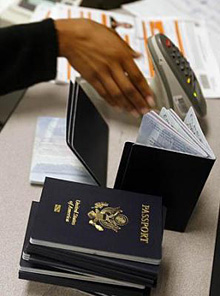
|
 |
 |
 Travel & Outdoors | February 2008 Travel & Outdoors | February 2008  
US Border Crossing Rules Tighten as Passport Fees Rise
 Gary A. Warner & Amy Taxin - The Orange County Register Gary A. Warner & Amy Taxin - The Orange County Register
go to original


| | Aneshia Darensburg scans in passports to be printed while working at the U.S. Government Passport Office in New Orleans. (Amanda McCoy/Biloxi Sun Herald) | | |
Travelers face a double whammy as border controls tighten and the price of a new passport jumps to over $100.

As of Jan. 31, all U.S. citizens must present either a passport or a government-issued photo ID, such as a driver's license, plus proof of citizenship, such as a birth certificate. The birth certificate must be an official government birth certificate, not the fancy keepsake kind parents sometimes receive at hospitals. There's a short list of other acceptable IDs, mostly military or government service cards.

A passport is already required for anyone entering the United States from any foreign country by air. Mexican citizens already have to have a valid passport and visa to enter the country legally. More lax standards were in place at the Canadian border, but a passport will be required as of 2009.

Customs officials said the first day of the new rules went smoothly. Few delays were reported at the Mexican and Canadian borders despite fears that new rules would create a logjam. Travelers without the proper identification under the new rules were allowed in after a review of documents they had, but officials said the informal grace period will be short.

The State Department and Department of Homeland Security have said the stricter rules at the once relatively informal borders were needed to better control who gets into the country legally. The U.S. Customs Service reported that over the past two years, some 31,000 people claiming U.S. citizenship at the border were not citizens.

The rules will tighten again later this year. The government does not have a firm date for when it will require everyone traveling overseas to have a passport. The original target date was at the beginning of this year. Last fall, the official state department Web site had the not-very-helpful projected deadline of ''summer 2008.'' Now it simply says ''Later.'' Arguments between Congress and the Bush administration over implementation of the new standards has kept the deadline fluid.

But sometime within the next year, it is expected most U.S. citizens entering the United States at sea or land ports of entry will have to show either a U.S. passport or a U.S. passport card (a new item under development). Again, there are exemptions for people with certain special IDs, mostly for merchant mariners and military personnel.

Officials say travelers are best off getting a passport, which are now available at additional locations such as some city halls. Renewals can be done by mail.

Meanwhile, the cost of a passport hit $100 on Feb. 1.

The State Department announced the new prices recently, saying the higher fees were imposed ''to cover the cost of providing efficient and secure passport services.'' It's a small but crucial increase, with the price of a passport now crossing into triple figures. Passports went from $97 to $100 for adults. Children's passports (for those younger than 16) climbed from $82 to $85 for children younger than 16. Renewals that had cost applicants $67 have risen to $75.

The State Department also changed a crucial law for parents - particularly those in families with divorces. Previously, both parents were required to appear in person to get a passport for a child younger than 14. That age has now risen to 16. One parent can still get the passport with the copious documentation of the other parent's consent. Check out the State Department Web site for all the rules.

Another option for people who cross the border frequently is the new U.S. Passport Card. U.S. citizens could begin applying for the card as of Feb. 1.

The wallet-sized card can be used to meet the land and sea border travel documents requirement. The card will not be honored for air travel outside the U.S. The State Department hopes to start mailing the cards later this spring.

The card is good for the same time period as a regular passport: 10 years for an adult and five years for children 15 and younger. The card costs $45 for adults and $35 for children. For adults who already have a passport, but want the convenience of the passport card for short trips, the cost will be $20.

The card has been somewhat controversial because it will carry radio frequency identification (RFID) chip used by the Department of Homeland Security that can be read over very short distances. The chip will link the card to records in government databases.

All these moves are part of the Western Hemisphere Travel Initiative, approved by Congress and President Bush in 2004.

It used to be that travelers did not need a passport to visit Mexico, Canada, Bermuda and 17 places in the Caribbean. After 9/11, there were moves to change the informal policies and bring them more in line with the stricter general policy on foreign arrivals. Last year anyone traveling by air was required to have a passport to get back into the country. After lobbying from the cruise industry, a similar rule for those arriving by sea or land has been delayed. After the unexpected passport application crunch last year and the long delays, Congress agitated to have the timeline stretched out even further.

Sometime within the next year, it is expected most U.S. citizens entering the United States at sea or land ports of entry will have to show either a U.S. passport or a U.S. passport card (a new item under development). | 
 | |
 |



